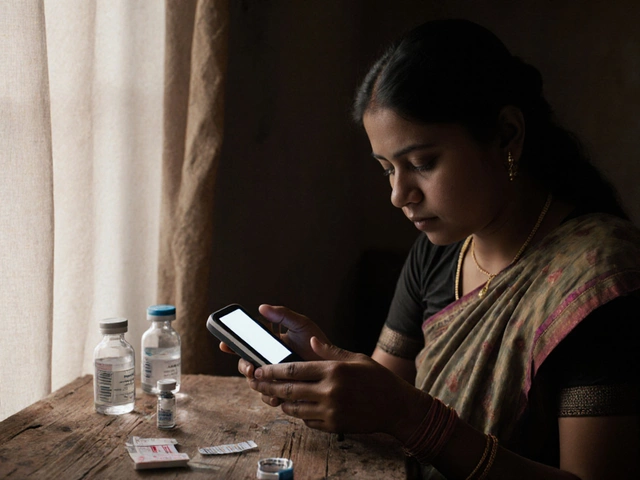A silent problem is growing worldwide, bigger than many physical illnesses. Here's the startling part: according to the World Health Organization, about 1 in 8 people around the globe live with some kind of mental disorder. That's a lot of us. What if I told you that understanding the basics—what mental health really means, and the different types—could transform not just your well-being, but your relationships, your work, and even your daily happiness? Knowing the "four types of mental health" isn't just textbook knowledge—it's about making your life feel lighter, more balanced, and, honestly, a bit easier day to day.
Emotional Health: Your Inner Weather Report
Ever felt like you were walking around under a gray cloud, or riding a wave of unexplained joy? That’s emotional health making itself known. It’s about how you handle your feelings, both the good and the bad. Emotional health shapes the way you bounce back from setbacks, your ability to soak in happiness, and how you ride through tougher days. It has less to do with always being ‘okay’ and more to do with how flexible you are emotionally—can you adjust, express, and process your feelings rather than stuffing them away? Research from Harvard shows that people who are emotionally aware, who don't shy away from tough feelings, are actually more resilient and tend to recover from stress more quickly.
Simple check-ups you can do for your emotional health? Try journaling for ten minutes every morning—not to write a novel, but to spill out what’s on your mind. Call a friend and tell them how you really feel, not just the edited version. If you’re like me, who sometimes bottles things up till you burst (and yes, Anjali reminds me of this all the time), carving out moments for an honest check-in can feel like taking off a heavy backpack you didn’t know you were carrying. Tips that seem basic—drinking water, sleeping well, getting outside—are all acts of kindness to your mind because they make emotional processing smoother.
One quick fact: Emotional health is not about ‘positive vibes only.’ It’s about giving space to every emotion, finding meaning in sadness, and not punishing yourself for bad moods. Isn’t it wild that emotional thoughts can even impact your body? Stiff neck? Tension headache? Often, that’s unexpressed emotion at work. The next time you pause to notice how you’re feeling—without judgment—you’re actually supporting your long-term health.
Psychological Health: The Foundation Underneath
Think of psychological health as your brain’s background operating system. It covers your core beliefs, your sense of self, and how you interpret the world. It’s deeper than mood swings—this is about your motivation, your confidence, and the meaning you find (or lose) in life’s ups and downs. People with strong psychological health handle failure without crumbling, trust their own abilities, and aren’t thrown off course by every challenge. Studies have shown that people with a solid psychological core tend to live longer, healthier lives and recover faster from illnesses.
Want to strengthen psychological health? It’s not just about therapy (though there’s no shame in it—honestly, everyone could use a mental tune-up). Try practicing self-acceptance. When’s the last time you said, “Okay, I’m not perfect, but I’m growing”? Steer away from destructive self-criticism. You’re probably harder on yourself than anyone else is. My dad used to write down one proud moment each week in a little notebook—that tiny act added up to a mountain of improvement in his self-worth over the years. You can do this too, however you want: sticky notes, voice notes, texts to yourself.
One myth that drives me nuts—having rock-solid psychological health doesn’t mean you never break down. Actually, it’s the opposite. The healthiest people let cracks show; they just have a toolkit for patching themselves up again. Some psychologist friends tell me that even teaching children simple strategies like naming their feelings or being kind to themselves has a huge impact later on. Cool, right? It’s like giving your brain an extra layer of armor for tough days.

Social Health: The People Who Hold You Up
You know that saying, “Show me your friends and I’ll show you your future”? Turns out, it’s not just good life advice—it’s mental health science. Social health is about your connections with others: whether you feel supported, accepted, and truly part of something. Lonely people are more likely to get sick, to struggle with their thoughts, and even to die younger. The longest-running study on happiness from Harvard, which has been going for over 80 years, found that close relationships, more than money or fame, are key to a fulfilling life and strong health. Seriously—friendship beats everything.
How do you check your social health? Ask yourself: when was the last time you reached out to someone just to chat? Not for anything important, just to feel connected? Are your relationships mostly supportive, or do they leave you drained? Even small actions count: asking a neighbor how their day’s been, joining a club, or saying yes to coffee invites. It’s so easy in today’s hyper-connected world to forget what real connection feels like–it’s different from likes or DMs. Sharing a meal, talking face-to-face, laughing out loud together—these are what fill up your social health tank.
Interesting fact: Even people who describe themselves as ‘introverts’ thrive when they have at least a few meaningful connections. You don’t need a crowd; you need true bonds. If you find yourself feeling isolated, try volunteering. It connects you with people and gives you a sense of purpose, both major boosts for social health. Relationships take effort, sure, but the rewards can’t be faked. Honest connection is like a secret medicine for your mind.
Cognitive Health: How You Think, Learn, and Remember
Cognitive health covers how fast and sharp your mind works—how you process information, remember things, solve problems, and keep your brain active as you age. When you’re young, it feels like your brain is on autopilot. But the truth? What you do every day either strengthens or slows down your cognitive abilities. This side of mental health types isn’t just about avoiding big diseases like dementia—it's about keeping your memory snappy, your problem-solving skills sharp, and your mind curious no matter your age.
The coolest thing? Your brain is like a muscle—use it or lose it. Small habits make a huge difference: reading something new each day, learning a language (even a few words here and there), doing puzzles, or swapping your regular route to work for a different one. These shake up your thinking and keep your brain on its toes. I tried switching from sudoku to learning some simple card magic tricks last year, and the mental boost was real—not to mention the fun I had showing off to Anjali and our friends.
Fact check: A study from University College London found that lifelong learners had a 30% slower rate of cognitive decline. So learning isn’t just about the classroom; it’s mental fuel. Also, movement matters—a healthy brain needs a healthy body. Exercise promotes blood flow and literally creates new neural connections in your brain. Next time you’re deciding between the couch and a walk, remember you’re not just moving your legs—you’re protecting your mind. And nutrition counts too: omega-3s from fish, leafy greens, and enough water give your brain what it needs to work its magic.
Last tip, and maybe the most practical—don’t multi-task all the time if you want a sharp brain. Multitasking can actually slow you down and increase mistakes. Want to keep your mind clear? Focus on one thing at a time, take regular breaks, and get enough sleep. Yes, naps are brain-friendly.






